2020 18-Day Campaign to End Violence Against Women
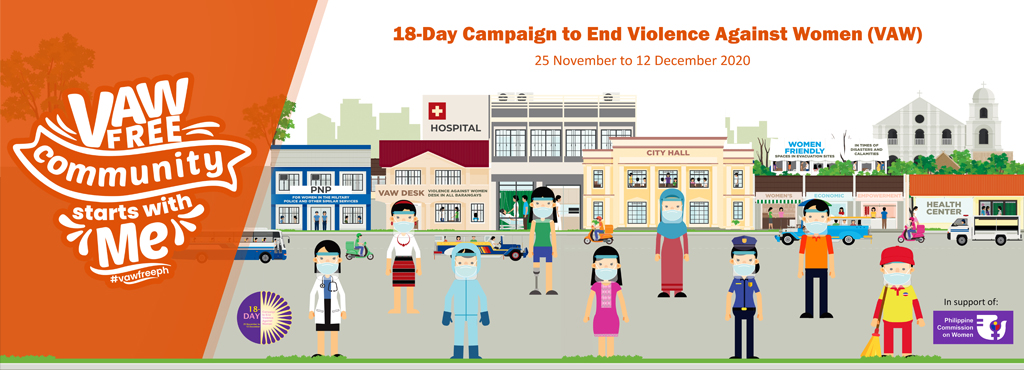
Violence against women (VAW) is a grave violation ofwomen’s rights and fundamental freedoms. It manifests deep-seated discrimination and gender inequality and continues to be one of the country’s perennial social problems. The National Demographic Health Survey 2017, released by the Philippine Statistics Authority, showed that 1 in 4 Filipino women, aged 15-49, has experienced physical, emotional or sexual violence from their husband or partner. While the global estimates by the World Health Organization indicate that about 1 in 3 women (35%) worldwide have experienced either physical and/or sexual violence from intimate partner or non-partner in their lifetime.
The United Nations define VAW as “any act of gender-based violence that results in, or likely to result in, physical, sexual, or mental harm or suffering to women, including threats of such acts, coercion or arbitrary deprivation of liberty, whether occurring in public or private life.” Violence and the threats of violence can be experienced by every woman of any age, skin color, gender identity, ethnicity, religion, disabilities, economic, and social status.
Downloads
The Campaign
VAW is one of the country’s pervasive social problems and various measures and mechanisms have been employed and implemented to address it. One of which is the 18-Day Campaign to End VAW, an advocacy campaign that is observed annually from November 25 to December 12 as mandated by Proclamation 1172 s. 2006
The 18-Day Campaign to End VAW supports the Philippine government’s goal of protecting the human rights of women and girls by upholding its commitment to address all forms of gender-based violence as enshrined in the 1987 Constitution. By virtue of Republic Act 10398 or the Act declaring November 25 of every year as the National Consciousness Day for the Elimination of VAWC, government agencies are mandated to raise awareness on the problem of violence and the elimination of all forms of violence against women and girls.
Globally, the 16-day action against gender-based violence has been acknowledged to support the international campaign that originated from the first Women Leadership Institute at Reuters University, New Jersey, USA in 1991. The observance of this campaign started in November 25, which is the International Day to Eliminate VAW up to December 10, which is the International Human Rights Day, to emphasize that VAW is a human rights violation and to ensure better protection for survivors and victims of violence. In 2002, the Philippine Government, through the Philippine Commission on Women and key stakeholders joined the global campaign, initially to push for laws and the establishment of institutional mechanisms to address VAW.
In 2006, then President Gloria Macapagal-Arroyo signed Proclamation 1172, extending the national campaign to 18 days, thereby including December 12, a historic date that marked the signing in the year 2000 of the UN Protocol to Prevent, Suppress and Punish Trafficking in Persons, especially Women and Children, to supplement the UN Convention Against Transnational Organized Crimes.
The campaign was further strengthened in 2008 when the United Nations Secretary General launched the UNiTE to End VAW Campaign, which envisions a world free from all forms of violence against women and girls. For the UN, this vision can only be realized through meaningful actions and ongoing political commitments of national governments, supported by adequate resources.
2020 Campaign Theme and Objectives
The 2020 Campaign comes at a time when the country is reeling from the COVID-19 pandemic that aggravated underlying gender issues and affected marginalized and vulnerable sectors. Women may experience different forms of VAW while locked down in their homes with the perpetrators, with tension rising from uncertainties in health, security, and economy creating a perfect storm. The implementation of varying community quarantine measures also hindered victims to seek help, report the abuse, and/or escape their perpetrators due to the suspension of public transportation, strict orders to stay home, and limited issuance of quarantine passes. Sexual harassment, victim-blaming, and several instances of online forms of VAW were also observed.
The COVID-19 pandemic highlighted the challenge of strengthening the functionality of Barangay VAW Desks, as the first line of response for survivors. Data from DILG’s 2019 National Statistical Report on the Functionality of VAW Desks reflect that only 19% of assessed barangays have reached the highest level of functionality. The Commission sees an opportunity to align this year’s campaign towards strengthening local mechanisms and building on the required competencies of barangay officials in responding to VAW/GBV-related situations.
Therefore, this year’s campaign highlights the role and essence of the Barangay, as part of a VAW-free community, in consonance with the recurring theme “VAW-free community starts with Me”. Aside from capacitating VAW Desk Officers and other barangay officials on how to handle VAW/GBC cases, the campaign reiterates everyone’s commitment and contributions on ending VAW and calls on the general public to make a personal commitment to end violence against women and children.
This campaign aims to:
- Promote awareness on the forms of violence women and girls experience;
- Provide information on laws protecting women and girls;
- Feature VAW-related services that people can access and avail; and
- Promote the strengthening of a prevention and response system on VAW; and
- Gather public support for the campaign
18 Things that We Can Do to Help End VAW
Woman/Girl
1. Empower yourself. Know your rights and available courses of actions in case these rights are violated.
2. Speak out and report to the authorities in case your rights are violated.
3. Encourage others to fight for their rights.
Man/Boy
4. Respect women and girls in your home, workplace, and community.
5. Join male groups promoting Anti-VAW efforts and participate in discussions to broaden your awareness on the advocacy.
6. Enlighten/advise perpetrators to seek help and join the male Anti-VAW supporters.
Government Agency
7. Equip yourselves with apt trainings and capacity development sessions to improve service delivery for your clients.
8. Develop monitoring and evaluation strategy to assess the service to your clients’ supporters.
9. Let people know that you provide the services! We need to inform the public that there are government offices that they can turn to and trust to assist them towards healing and seeking justice.
Barangay
10. Ensure that your Barangay VAW Desk is functional. You can use the Barangay VAW Desk Handbook developed by PCW and DILG with partner agencies to guide you on what to do.
11. Establish linkages with local and national government agencies, as well as other organizations near your barangay where you can refer victim-survivors of VAW for needed assistance which the barangay is not able to provide.
12. Promote harmonious family and community relationships in your barangay which is grounded on mutual respect for human rights, and take proactive steps to attain a VAW-free community.
Private sector
13. Support the Anti-VAW efforts of the government and your immediate community.
14. Establish your own Action Desks where employees and clients can go to in case VAW happens.
15. Develop internal rules to proactively ensure that your workplace is VAW-free.
Academe/Training Institutions
16. Include concepts of VAW and women’s human rights in lesson plans/lesson guides of your teaching staff
17. Continually conduct/spearhead anti-VAW advocacies in your campus, and if possible, to your immediate community through extension programs.
18. Setup a Committee on Decorum and Investigation (CODI) where students and employees can seek help.
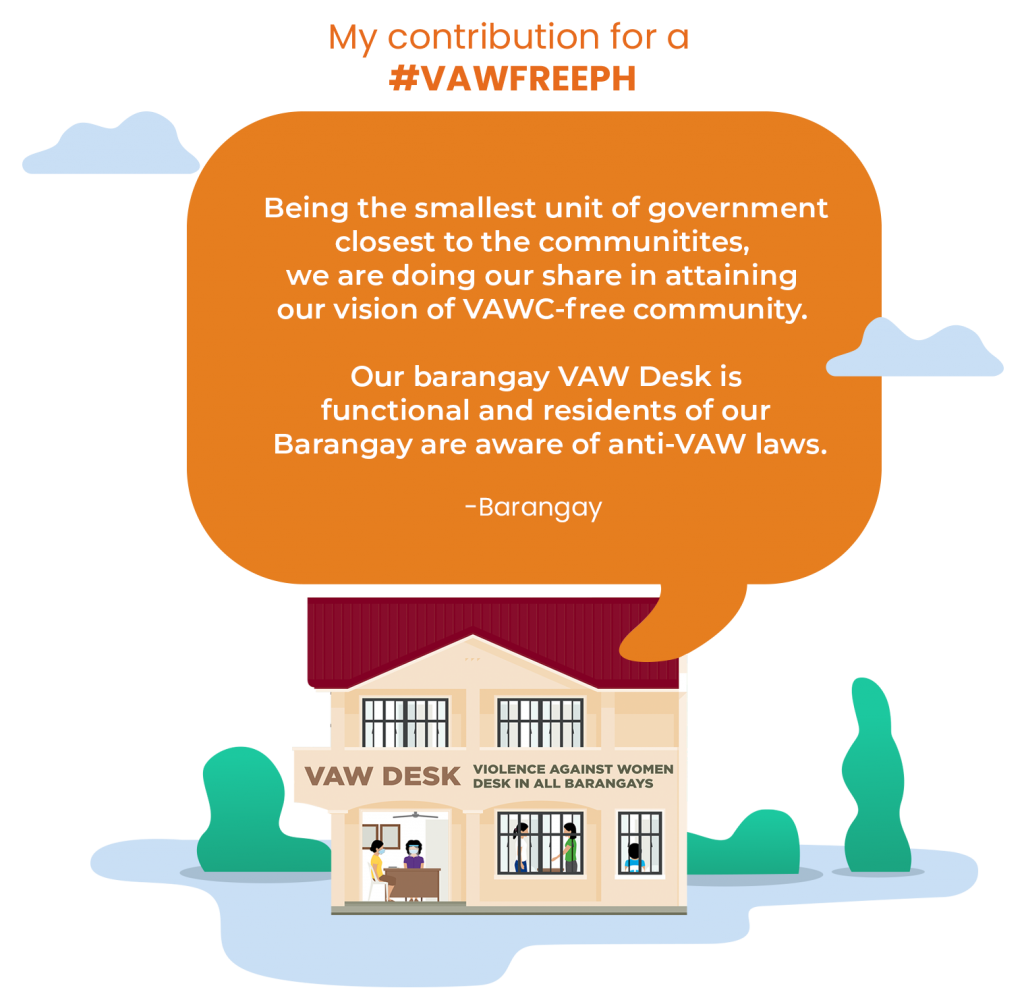
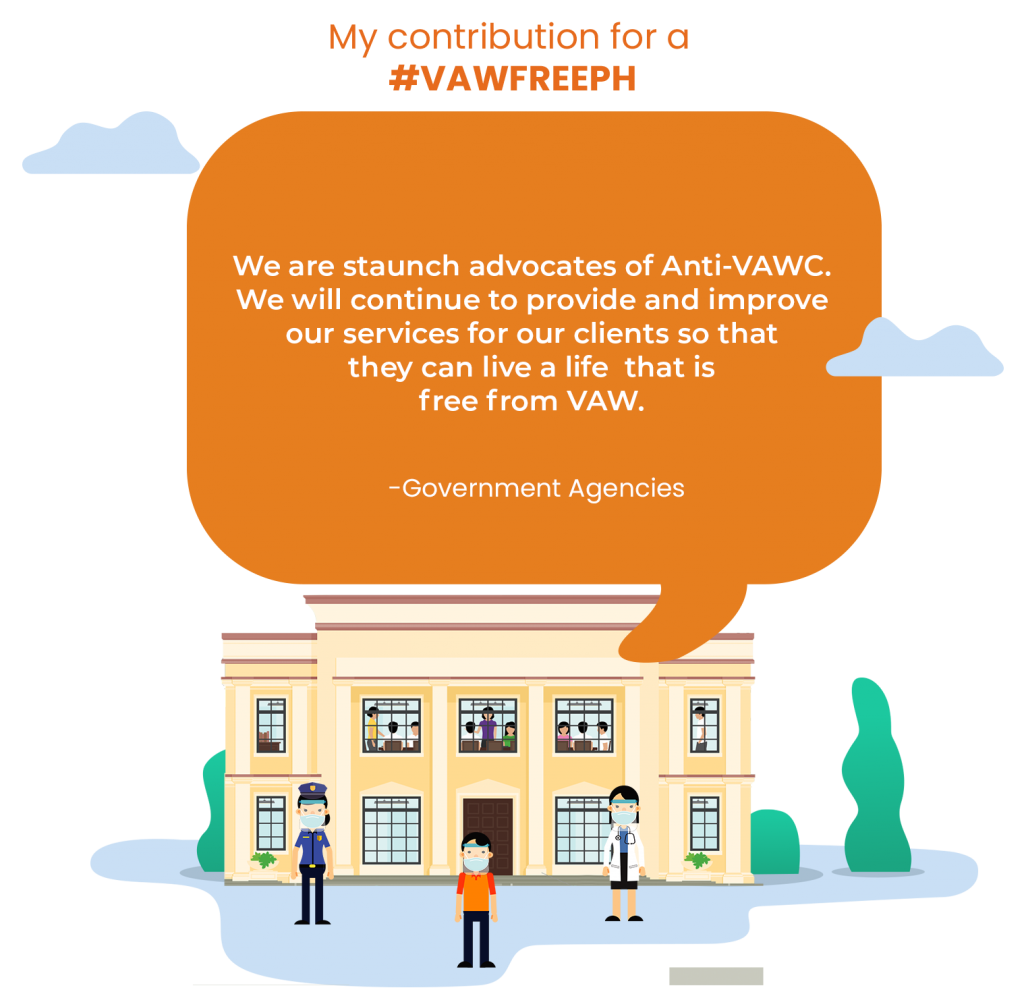
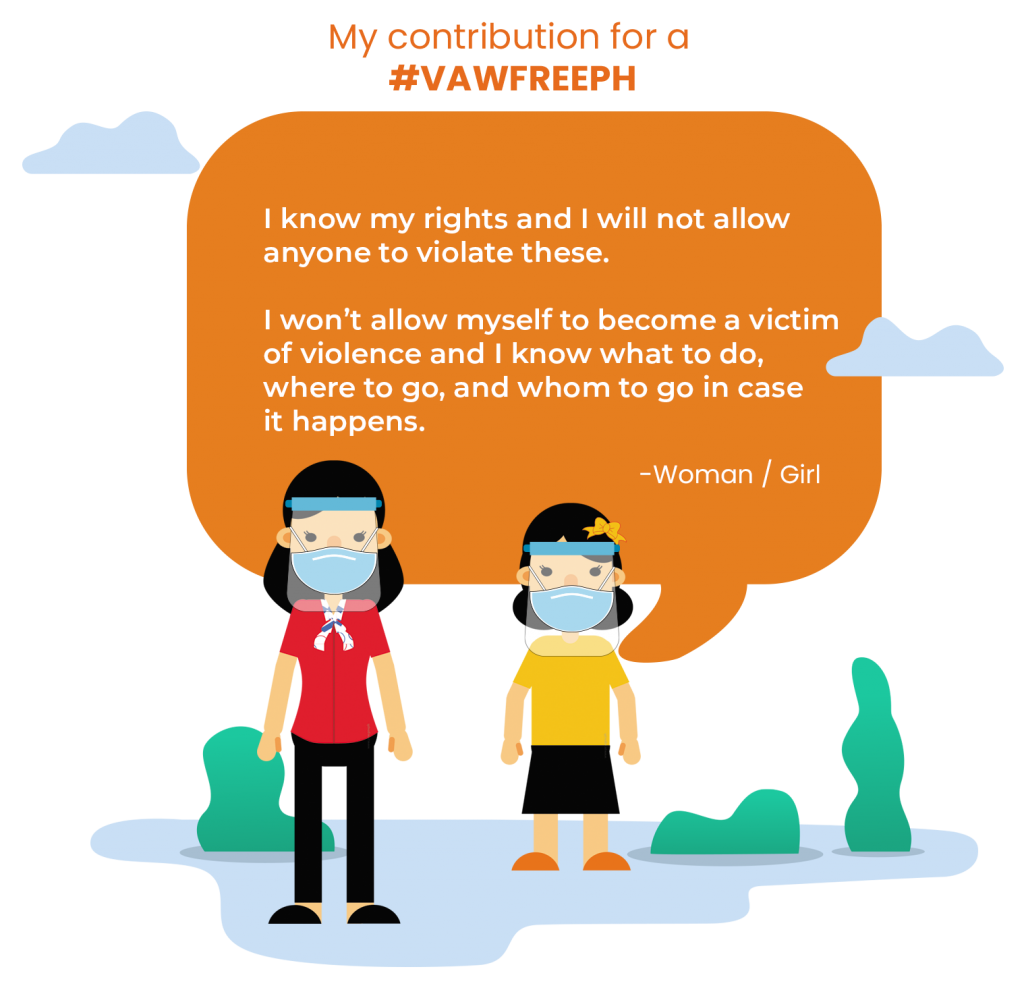
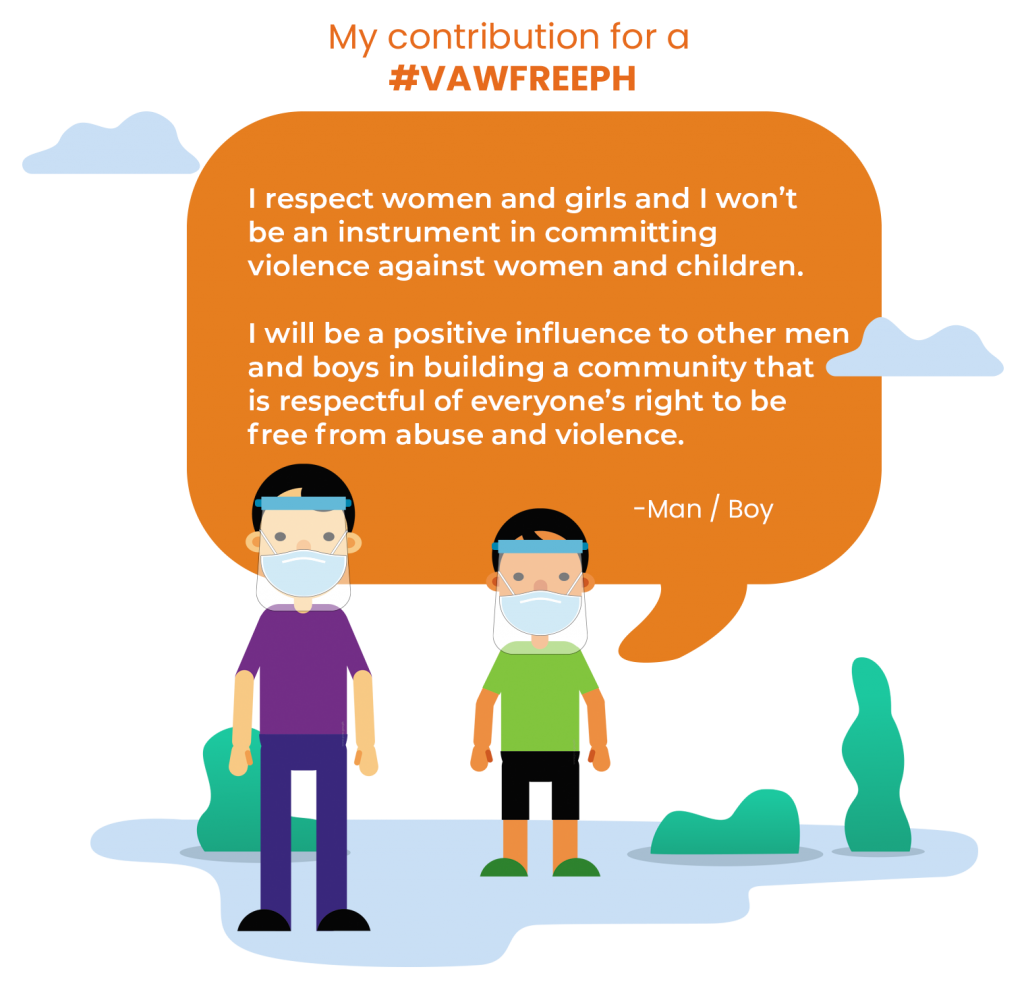
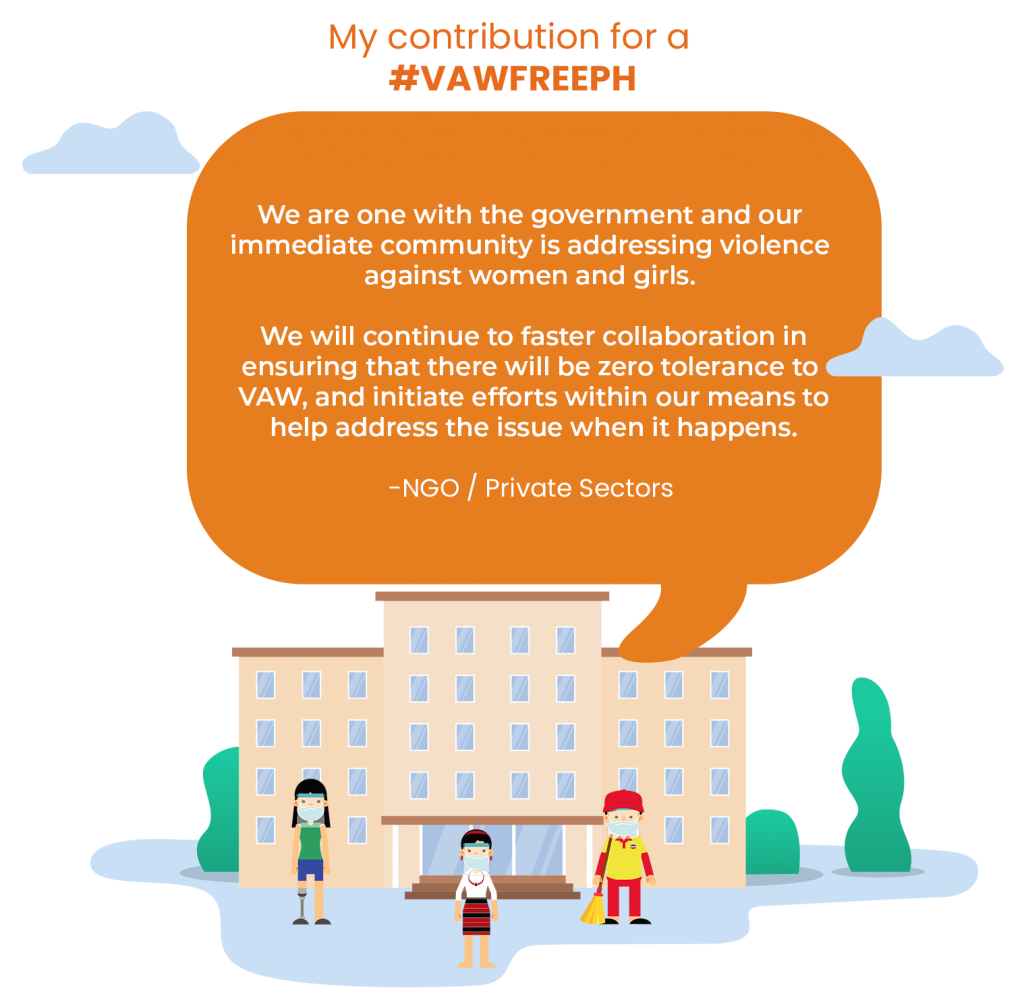
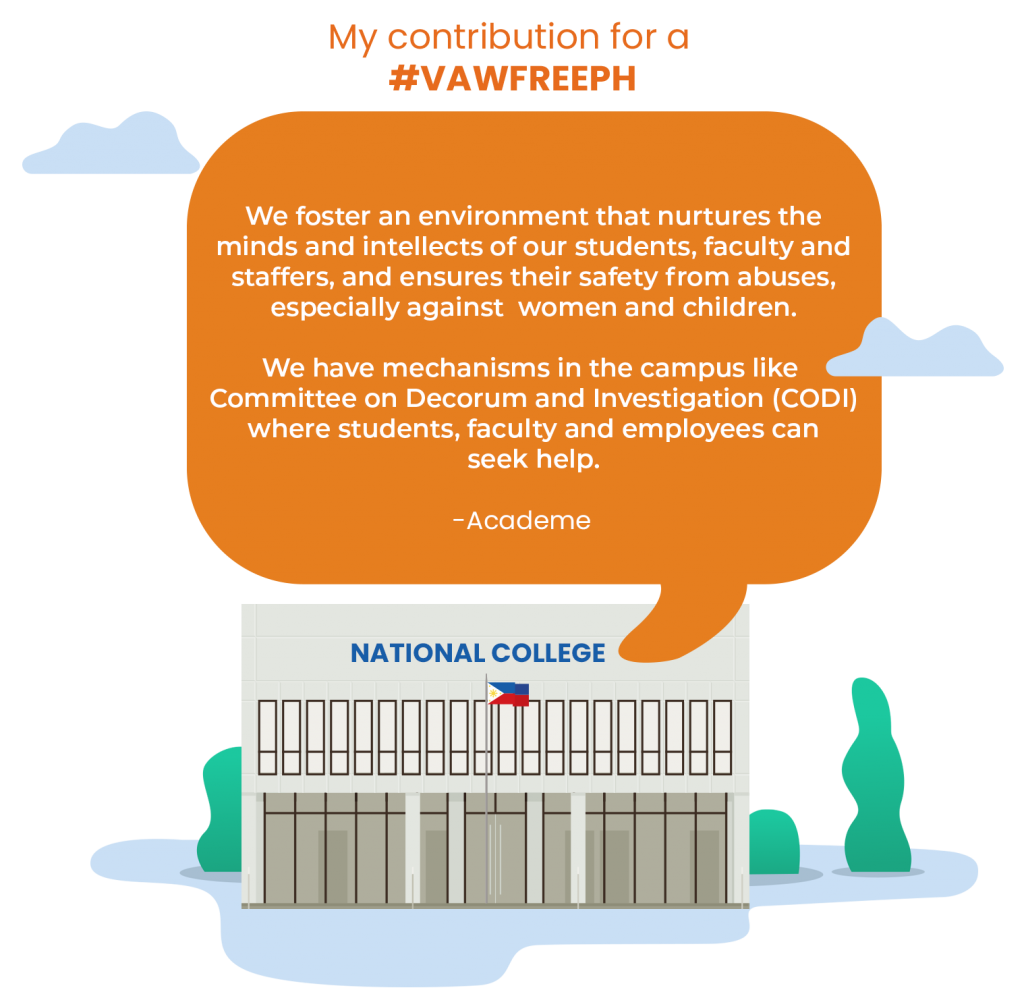
2020 Campaign Activities
The following activities are spearheaded by the PCW in partnership with key partner institutions:
2020 Online Talakayan towards VAW-free Barangays – Adapting to the new normal, the PCW reaches out to the stakeholders through virtual platforms by launching an Online Talakayan series. This aims to strengthen the protection of women from VAW in the grassroots by informing service providers of the roles and responsibilities of Barangay VAW Desks, laws on VAW including Republic Act 9262, role of other service providers, and the referral network in effect for victim survivors. The series will also comprise of talakayan on sexual harassment, the Safe Spaces Act, and laws against trafficking in persons.
| 2020 Online Talakayan towards VAW-free Barangays Schedule |
| November 25 | Opening Ceremonies and Basic Concepts on VAW/GBV |
| December 2 | R.A. 9262 (Anti-VAWC Act) |
| December 4 | Establishment of VAW Desks in Every Barangay |
| December 9 | R.As. 7877 and 11313 (Anti-Sexual Harassment Law and Safe Spaces Act) |
| December 12 | R.A. 9208 (Anti-Trafficking in Persons Act) |
Distribution of IEC materials (November 25, 2020 to December 12, 2020) – IEC materials on VAW will be distributed in different barangays to further capacitate VAW Desks and stakeholders in the barangay. These will include primers, brochures, and posters with information on forms of VAW, actions to be taken in case of a VAW incident, and hotline numbers of service providers.
VAW Puppet web series – The VAW awareness puppet show from the 2019 Anti-VAW Expo goes online, packed with core messages on VAW shared through stories and characters expounding on VAW, sexual harassment, and trafficking in persons. The web series will be released on PCW’s official Facebook and Youtube accounts aiming to reach many of our stakeholders virtually.
Orange Your Icon for 18 Days – Now on its 6th year, this creative initiative enjoins stakeholders to signify their support to the campaign to end VAW by adorning their “landmarks” or “iconic spots” with the color orange. Aside from making this public statement, this activity also sparks the public’s curiosity, thereby providing opportunities for advocates to explain the cause. This initiative is in support of the global UN Secretary General’s UNiTE to End VAW Campaign. As a bright and optimistic color, orange was chosen to symbolize a brighter future for victim-survivors of VAW.
18-Day Campaign Online Advocacy
Everyone is encouraged to share their advocacy activities online through the following:
- Use of official hashtag: #VAWFreePH and making their posts public to generate traction online
- Use of 18-Day Campaign to End VAW Facebook Profile Frame available through the PCW FB page
- Feature the 18-Day Campaign to End VAW in agency websites and social media accounts
- Sharing the social media cards that PCW will release through its official Facebook and Twitter accounts

